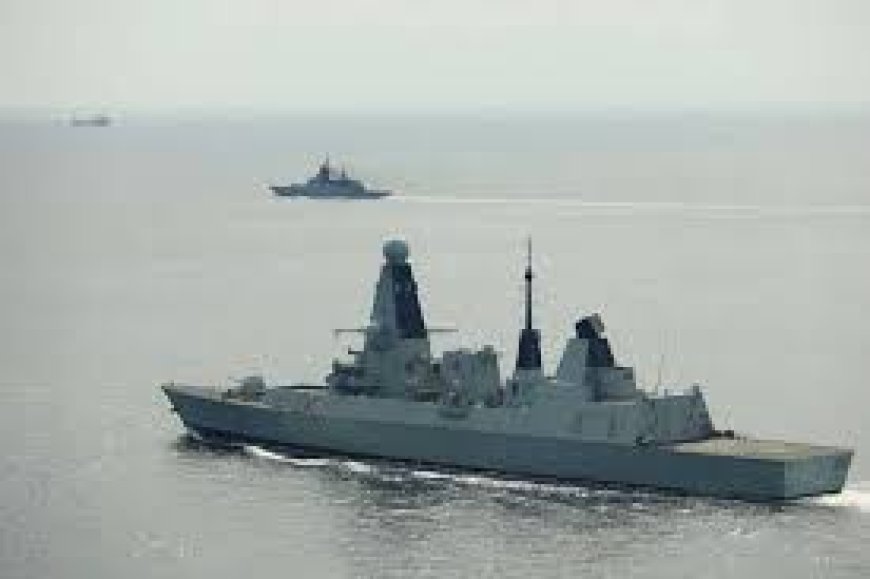British Navy deploys warships and helicopters to track Russian vessel in English Channel.
The British Royal Navy has hinted that British warships and helicopters were activated to monitor and escort Russian naval vessels transiting the English Channel and North Sea during a focused four-day operation.

The British Royal Navy has hinted that British warships and helicopters were activated to monitor and escort Russian naval vessels transiting the English Channel and North Sea during a focused four-day operation.
The Type 45 destroyer HMS Duncan and the River-class offshore patrol vessel HMS Mersey played central roles in shadowing the Russian Navy’s Steregushchiy-class corvette RFN Boikiy, which sailed east through the Channel.
This high-readiness mission underscored the commitment of the British Royal Navy to maritime security and NATO vigilance amid a surge in Russian naval presence near UK territorial waters.
The RFN Boikiy is a Russian Steregushchiy-class corvette, also known as Project 20380, assigned to the Russian Baltic Fleet. Designed for multi-role operations, it is equipped with stealth features, advanced sensors, and a robust weapons suite including Uran anti-ship missiles, Redut surface-to-air missiles, torpedoes, and a 100mm naval gun. The corvette also operates a Ka-27 helicopter for extended anti-submarine and surveillance missions. Its recent presence in the Channel marks a strategic move by Russia to assert its military presence in key maritime corridors and to provide armed escort for vessels operating under Western sanctions.
This operation followed shortly after HMS Trent and Wildcat helicopters from 815 Naval Air Squadron tracked the Russian frigate RFN Admiral Grigorovich as it moved from Gibraltar into the North Sea. The increasing frequency of Russian naval movements through strategically vital sea lanes has prompted coordinated responses among NATO allies. On June 20, 2025, HMS Duncan intercepted RFN Boikiy near the island of Ushant, at the southwestern edge of the Channel. HMS Mersey then assumed escort duties on June 21 off the Isle of Wight, allowing HMS Duncan to return to its scheduled training program ahead of future operational deployments.
The UK's Minister for the Armed Forces, Luke Pollard, reaffirmed that the British Royal Navy will continue to shadow all Russian warships near British waters and safeguard vital infrastructure including undersea cables. Commander Daniel Lee, Commanding Officer of HMS Duncan, highlighted the strategic importance of these missions as a clear demonstration of the Royal Navy’s readiness and its enduring commitment to protect British maritime interests.
This latest operation adds to a growing list of recent confrontations involving the British Royal Navy and Russian naval forces in the English Channel during 2025. On June 16, RFN Boikiy also escorted two sanctioned Russian oil tankers, Selva and Sierra, through the Channel. These tankers, under UK and EU sanctions, were reportedly heading to Russian ports for oil loading. The escort by a Russian warship marked an unprecedented development and signaled a clear escalation in Russia's maritime strategy by directly challenging Western restrictions.
Earlier in May, 2025, HMS Tyne shadowed the Russian Kilo-class submarine Krasnodar as it transited surfaced through the Channel, returning from operations in the eastern Mediterranean. In February, a larger Russian naval group was monitored by HMS Iron Duke, HMS Tyne, and RFA Tideforce. This group included landing ships Aleksandr Otrakovsky and Ivan Gren, along with merchant and logistical support vessels reportedly transporting military cargo from Syria. These consistent and deliberate transits reveal a significant uptick in Russian naval assertiveness near British and allied waters.
The British Royal Navy has responded to these developments by intensifying its maritime presence and surveillance operations. HMS Duncan, one of the most advanced Type 45 air-defense destroyers in service, is equipped with the Sea Viper missile system and state-of-the-art radar technology designed to track and neutralize multiple airborne threats simultaneously. Its roles include fleet protection, multinational operations, and helicopter deployment for anti-submarine and reconnaissance missions, making it a cornerstone of British maritime defense.
HMS Mersey, a River-class offshore patrol vessel, provides essential support for maritime security and territorial surveillance. Its missions include fishery protection, counter-smuggling, border enforcement, and escorting foreign warships through sensitive UK-controlled waters. Although lightly armed, HMS Mersey’s endurance and adaptability allow it to maintain a constant and effective presence in contested maritime environments like the English Channel.
The increasing presence of Russian warships in the English Channel throughout 2025 has prompted serious concern among defense planners and policymakers. The British Royal Navy's escalated readiness posture reflects the urgency of deterring hybrid threats, including undersea surveillance and sabotage activities that could target the UK's critical data and energy infrastructure. Through operations such as this, the British Royal Navy continues to assert its role as a global naval power and a steadfast defender of freedom of navigation and national security.
What's Your Reaction?

































































